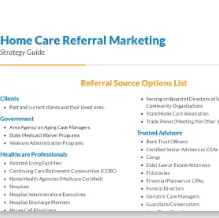If you’re trying to attract more clients and caregivers, what you say about your business doesn’t matter nearly as much as what your current clients and caregivers say about your business.
Not long ago, I was talking to the owner of an agency owner on the East Coast when he made a statement that got me thinking. In reference to marketing a home care agency, he stated, “Almost none of the tactics that worked ten years ago (or even five years ago) work for me today.”
What this agency told me isn’t uncommon; the truth is that the landscape has shifted dramatically, not just because of increased competition but because of changing consumer habits. The change in home care has followed several years behind a similar change in other industries, but the trend is the same.
Let’s talk about this change, and what you can do to address it.
- LIVE WEBINAR
4/25: Nursing Perspectives: Looking Beyond Compliance to See the True Value of Training
The Internet is Creating More Conversations
Jeff Bezos, CEO of Amazon, said it best: “It used to be that if a customer liked—or didn’t like—your business, they might tell six friends about it. Now, with the Internet, they might tell 6,000.”
As the internet and social media take an ever-increasing role in the way we seek out and provide goods and services, it’s easier than ever for potential clients and caregivers to learn from each other’s experiences with various home care agencies.
Your clients now have a multitude of ways to talk to other potential clients about your agency—in addition to talking to their friends, they might post about it on social media, comment on your company’s website, or write online reviews on any of dozens of platforms. Thanks to the Internet, there are many more conversations taking place about your business than there have been in the past—and you’ll probably never see most of these conversations.
Consumers Trust Each Other More Than They Trust Businesses
On top of the fact that it’s easier than ever for potential clients to learn about an agency over the Internet, they’re increasingly trusting what each other say over what those agencies are saying. According to a major study, 70% of consumers say they trust the word of other consumers more than they trust brands.
In other words, potential clients are generally much more likely to be swayed by what each other say about your agency than by your agency. That’s not to say that your clients don’t trust you, or that you don’t have great relationships with them—but ultimately we’re hardwired to trust the word of people who have walked in our shoes.
The Bottom Line: It’s What Your Clients (and Caregivers) Say That Matters
Here’s what this all boils down to: If you’re trying to attract more clients and caregivers, what you say about your business doesn’t matter nearly as much as what your current clients and caregivers say about your business.
The need to provide a great client experience isn’t new; what’s new is that it’s becoming much more difficult to successfully market your services if there are clients having negative or lukewarm experiences with your agency. Your marketing is only as good as your client experience.
As Steve Schildwachter, Chief Brand Officer of BrightStar Care, said recently: “Client experience and marketing are the same thing now.”
To keep growing in this changing marketing climate, you’ll need to do two things: first, place an even greater emphasis on client experience, and second, facilitate ways for thrilled clients to share their experiences with potential clients through any channel that a potential client might learn about your agency.
What You Can Do About It
You should work with your staff to establish how to best do this based on the specific circumstances of your agency, but here are some general steps to get you started.
1. Regardless of how well you’re already doing, take steps to improve your client experience even more. You probably already do a great job of caring for your clients—but most agencies do. The agencies that produce a client experience worth bragging about live and breathe the client experience by continually evaluating and improving the care they provide.
At Home Care Pulse, we survey thousands of clients and caregivers each month to learn what their agencies can do to improve the experience they provide. Here are some of the most frequent complaints we hear:
This article on the top complaints from clients and this article on the top complaints from caregivers might give perspective as well. How many of these issues does your agency deal with?
2. Double down on what differentiates your agency in order to become more unique. It might not be reasonable to be the best at everything, but you can focus on a certain type of care and put in the work to make your caregivers the best at it. You might provide the best Alzheimer’s or dementia care in the area, or you might become known as the best option for clients needing 24-hour care.
You can also differentiate your agency with the right proof of quality. If you’ve won a Best of Home Care award, showcase it wherever possible. These awards provide strong proof to potential clients that they can feel peace of mind with your services.
3. Actively manage your reputation and facilitate more opportunities for clients to brag about your agency to others.
Arguably the most important place to monitor and facilitate conversations about your agency is in online reviews. 88% of consumers read online reviews before they make a purchase, and that number is likely to be even higher in a major decision like getting in-home care.
Read our guide on getting more online reviews for your home care agency—and watch for important announcements in the future regarding more ways that we can help you get found online.
Other ways that you can make clients’ voices a central part of your marketing include:
The Proof is in the Pudding
Agencies that rely on their clients for growth will come out on top in 2019. According to data from the Home Care Benchmarking Study, agencies that list client referrals as one of their top two referral sources:
Home care is changing, and agencies that want to keep growing need to change with it. There’s a better way to grow—and the first step is to recognize that what your clients and caregivers say about your agency is far more than anything you can say about it.
If you’re not yet a customer of Home Care Pulse and would like to learn how we can help you engage your clients to help you grow your business, you can request a phone call here. If you are a Home Care Pulse customer, I’d challenge you to meet with your staff this week to create a plan on how you can more fully integrate client and caregiver feedback into your strategy in 2020.
Warmest regards,

Erik Madsen
Chief Executive Officer
Home Care Pulse








